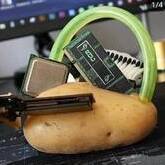Connect UPS into a Surge Protector
between the 2 options UPS to surge protector is better for the UPS but neither will hurt the equipment.
the surge protector filters power going through it before sending it to each device, this filtering can cause the UPS to display a different load than is actually being used. UPS will still last the same amount of time and power will still be sent to all the devices from the UPS in the case of a power failure.
This is the same reason for the UPS to be plugged directly into the wall rather than into the surge protector, filtered power is not going to hurt the UPS or equipment attached however you may get random beeps as the UPS momentarily has to use battery power to supply power while the surge protector is distributing the filtered power (typically when you plug in a new device and the surge protector has to balance the power between everything connected)
















Create an account or sign in to comment
You need to be a member in order to leave a comment
Create an account
Sign up for a new account in our community. It's easy!
Register a new accountSign in
Already have an account? Sign in here.
Sign In Now